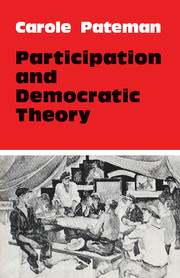Book contents
- Frontmatter
- Contents
- I Recent theories of democracy and the ‘classical myth’
- II Rousseau, John Stuart Mill and G. D. H. Cole: a participatory theory of democracy
- III The sense of political efficacy and participation in the workplace
- IV ‘Participation’ and ‘democracy’ in industry
- V Workers' self-management in Yugoslavia
- VI Conclusions
- Bibliography
- Index
- Frontmatter
- Contents
- I Recent theories of democracy and the ‘classical myth’
- II Rousseau, John Stuart Mill and G. D. H. Cole: a participatory theory of democracy
- III The sense of political efficacy and participation in the workplace
- IV ‘Participation’ and ‘democracy’ in industry
- V Workers' self-management in Yugoslavia
- VI Conclusions
- Bibliography
- Index
Summary
Recent discussions of the theory of democracy have been obscured by the myth of the ‘classical doctrine of democracy’ propagated so successfully by Schumpeter. The failure to re-examine the notion of a ‘classical’ theory has prevented a proper understanding of the arguments of (some of) the earlier theorists of democracy about the central role of participation in the theory of democracy; prevented it even on the part of writers who wished to defend a participatory theory of democracy. This has meant that the prevailing academic orthodoxy on the subject, the contemporary theory of democracy, has not been subjected to substantive, rigorous criticism, nor has a really convincing case been presented for the retention of a participatory theory in the face of the facts of modern, large-scale political life.
The major contribution to democratic theory of those ‘classical’ theorists whom we have called the theorists of participatory democracy is to focus our attention on the interrelationship between individuals and the authority structures of institutions within which they interact. This is not to say that modern writers are completely unaware of this dimension; clearly this is not so, as much political sociology, especially that dealing with political socialisation, confirms, but the implications of the findings on socialisation for the contemporary theory of democracy have not been appreciated. The link between these findings, particularly those on the development of the sense of political efficacy in adults and children, and the notion of a ‘democratic character’ has been overlooked.
- Type
- Chapter
- Information
- Participation and Democratic Theory , pp. 103 - 111Publisher: Cambridge University PressPrint publication year: 1970



